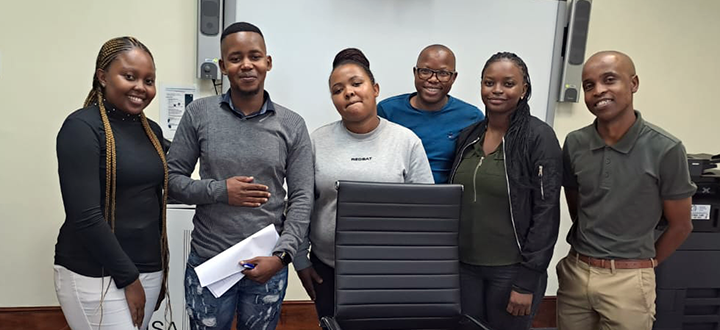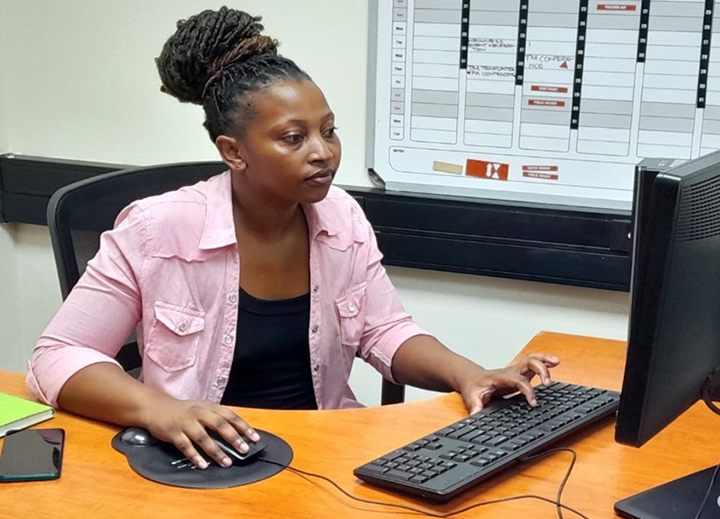News & Events
Presidential Youth Employment Stimulus set to bolster Unisa graduates' employability
In a bid to bolster the employability of its graduates, Unisa has partnered with the Department of Higher Education and Training to participate in the Presidential Youth Employment Stimulus (PYES) initiative.
Through its Human Resource Development (HRD) division, Unisa is hosting the initiative by offering in-service training to prepare its graduates for better employment opportunities in any sector where their acquired knowledge and skills assimilate.

Some of the interns from the 2023 intake
Opening employment opportunities
The six-month PYES graduate workplace internship programme aims to provide Unisa graduates with relevant work experience in their respective fields of study, thereby enhancing their readiness for future employment opportunities. Considering the restraint of the initial PYES six-month timespan to enrich knowledge and skills, the university’s Eastern Cape Region, in dedicated support of the project, has gone beyond conventional measures by allocating a budget for an extension of the internship period by a further six months. By so doing, the interns will have a full one-year phase placement which benefits them immensely while validating their practicum and opening better employment opportunities to prospective work organisations.
Furthermore, through the support of the HRD and ratification from the Finance Department, the Eastern Cape Region reserved budget allocation to appoint at least 21 interns across the region during the 2024 academic and fiscal year. This is aimed at sustaining continuation of support to Unisa graduates, and represents a significant increase from the 17 interns which were appointed in 2023.
This initiative-taking measure underscores the Eastern Cape Region's dedication in supporting the growth and readiness of young graduates for the workforce. Furthermore, this initiative is appropriately aligned to Unisa’s theme of “Reclaiming Africa’s intellectual futures into the next 150 years and beyond” through ensuring that graduates find their way to be employable and contribute meaningfully to the country’s socio-economic development.
By investing in an internship programme and expanding internship opportunities, the region aims to bridge the gap between academic learning and practical experience. Through active participation in the development of its graduates, Unisa is fulfilling its role as a key player in the socio-economic growth and transformation agenda in the Eastern Cape Region and countrywide.
Participant testimony
One of the internship programme’s beneficiaries, HR intern Anele Manyisa, expressed how the internship programme has aided her: “The Unisa internship programme has provided me with an invaluable growth opportunity. Through this experience, I have had the chance to acquire practical workplace skills and expand my knowledge within the HR field. It is truly an honour to be a part of one of Africa’s leading universities, renowned for its commitment to distance learning and its mission to serve humanity.’’

HR intern Anele Manyisa puts theory into practice
Customer training is key
The significance of customer service cannot be overstated in today's business landscape. Recognising its pivotal role, Unisa’s interns participated in an intensive two-day training programme dedicated to honing their skills in customer service. This immersive session was meticulously designed to deepen their understanding of Unisa as an institution and its diverse range of offerings, and to ensure that their service delivery aligns seamlessly with the standards set forth in Unisa's Service Charter.
Evaluation and monitoring
Additionally, the collaboration between the Eastern Cape Region and HRD encompasses a comprehensive oversight framework. Through regular assessments conducted across the Gqeberha, Umtata and East London offices, the effectiveness of the internship programme is meticulously evaluated.
This includes ensuring that interns have access to the necessary tools of trade, monitoring the fulfilment of training objectives, and verifying that mentors are providing the expected level of supervision and guidance.
Such diligent monitoring not only safeguards the integrity of the programme, but also serves as a testament to the commitment of both the region and HRD to uphold the highest standards of professional development and support for emerging talents in the region.
* By Tsholofelo Kgaswane, Human Resource Officer: Unisa Eastern Cape Region
Publish date: 2024/03/20
